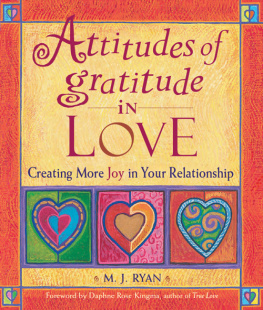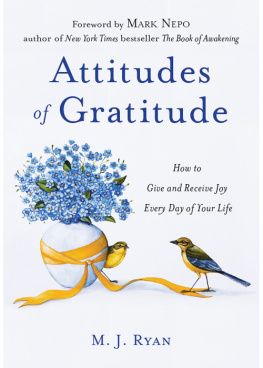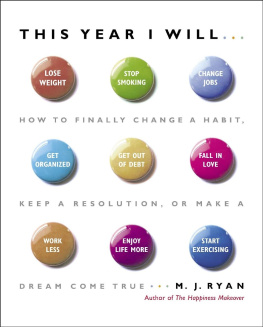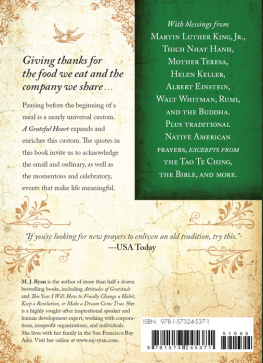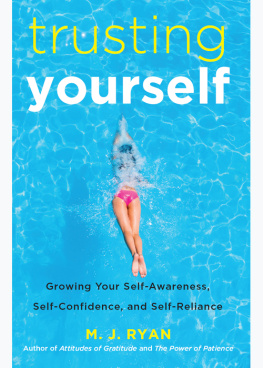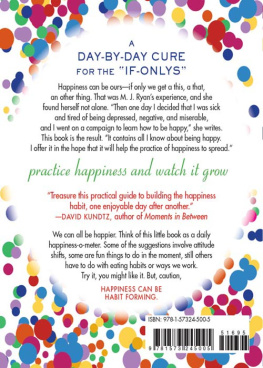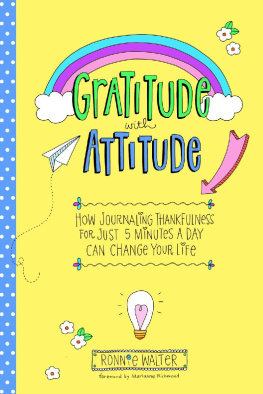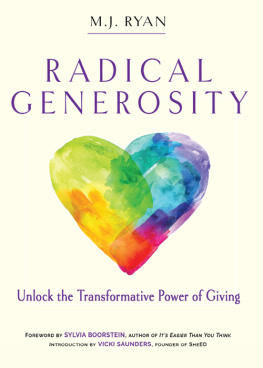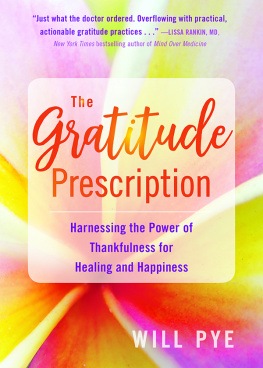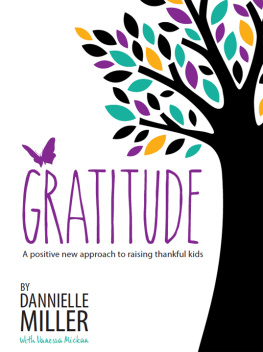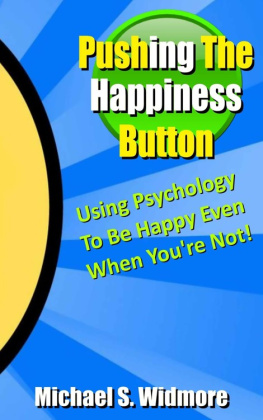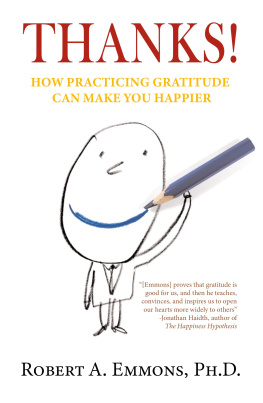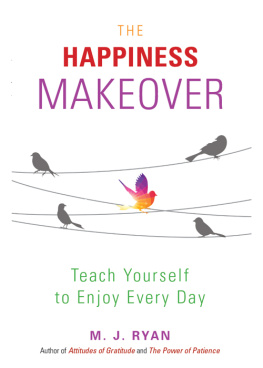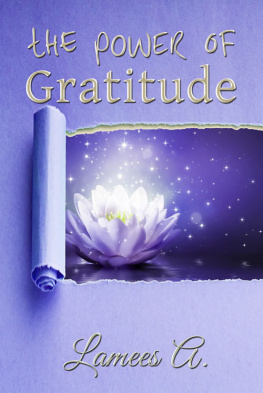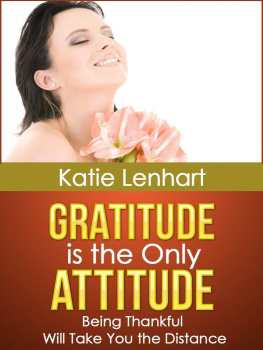
Copyright 2002 by M. J. Ryan
All Rights Reserved. No part of this book may be used or reproduced in any manner whatsoever without written permission, except in the case of brief quotations in critical articles or reviews. For information, contact: Conari Press, an imprint of Red Wheel/Weiser, LLC, P.O. Box 612, York Beach, ME 03910-0612.
Cover Illustration: Roger Montoya
Cover Design: Claudia Smelser
Book Design: Suzanne Albertson
Interior Illustrations: Roger Montoya
Library of Congress Cataloging-in-Publication Data
Ryan, M. J. (Mary Jane), 1952
Attitudes of gratitude in love : creating more joy in your relationship / M. J. Ryan; foreword by Daphne Rose Kingma.
p. cm.
ISBN 1-57324-765-0
1. Love. 2. Gratitude. 3. Man-woman relationships. I. Title.
BF575.L8 R93 2002
306.7--dc21
2002003510
Printed in the United States of America.
02 03 04 05 TC 10 9 8 7 6 5 4 3 2 1
www.redwheelweiser.com
www.redwheelweiser.com/newsletter
The world is not a playground; it's a schoolroom. Life is not a holiday but an education. And the one eternal question for us all is how better we can love.
HENRY DRUMMOND
Attitudes of gratitude in Love
Foreword
by Daphne Rose Kingma
1
THE KEY TO LIVING OUR LOVE
2
THE GIFTS OF RELATIONSHIP GRATITUDE
3
MYTHS THAT HOLD US BACK
4
LOVE'S ATTITUDES OF GRATITUDE
5
THE PRACTICE OF GRATITUDE IN LOVE
6
THE JOYFUL JOURNEY
FOREWORD
BY DAPHNE ROSE KINGMA, AUTHOR OF TRUE LOVE
I have always believed that gratitude is the saving grace in any intimate relationship. A simple Thank you, a heartfelt I appreciate, a thoughtful I'm so grateful... all bring a quality of joy and a sense of belonging to the people who give and receive them. In their humble, gracious way, expressions of gratitude enliven any relationship. Given that this is true, that we can feel betterhappier, more optimistic, more connected, and more joyfulthrough these simple expressions of appreciation, it's amazing how rarely we communicate our gratitude, and remarkable that in fact we need to be reminded, instructed to do so.
One of the reasons for this is that the emotional state of gratitude is, in itself, an experience of vulnerability. We don't feel grateful or say Thank you for something that wasn't needed, isn't valued, or doesn't fill an emptiness of some kind. We don't often think of gratitude as exposing our vulnerability in this way, but the truth is, the person who has gratitude to express has in some sense been lifted from a place of lack or need to a place of well-being and abundance. Through a gracious word or deed on the part of another, a wound has been dressed, an emptiness filled, a moment of being enhanced. So it is that when we express our gratitude, we can become aware, in a single instant, both of our own needs and of another's generosity in filling them.
It's uncomfortable to feel vulnerable, though, and so we'd often just as soon receive the giftwhatever it iswithout further exposing ourselves by also saying Thank you. As a consequence, we tend to operate from a taking-it-for-granted rather than a taking-it-ingratitude mode in our relationships. And unfortunately, it's often the closer the relationship, that the more lax we become about giving voice to our gratitude. We're happy to have the car fixed, the dinner made, the travails of the workday listened to, the mother-in-law carted off to her doctors' appointmentsand to see all these simply as the natural functions of a relationship. But when we respond to these extraordinary ordinary gifts with thanksgiving, our appreciation returns a gift to the giver, forms a new strand of connection, and strengthens the weave of our bond.
In this sense gratitude isn't just good manners, it is relationship building. For when we are grateful, we acknowledge both the truth of our needs and the miracle that they have been addressed. And the more we live with a conscious awareness of both of these, the more we are able to see exactly how we love one anotherand how much we are loved in return.
Gratitude is a powerful instrument for change. That's because each time you express it, your brain erases a little bit more of the patterns it holds of feeling deprivedof being unheard, unheld, un-felt-with, or alone. Every valley exalted by gratitude will stand as a mountain of hope in your heart. And the ongoing expression of your gratitude will be a constant reminder that you are blessed by your relationship, that life is benevolent and kind.
In this lovely book, M. J. Ryan shares her own steps on the path of gratitude. In so doing she offers a wonderful teaching in the hows and whys of thanksgiving for your own relationship. I hope you will enjoy it as the gift it is, and receive it with a grateful heart.

THE KEY TO LIVING OUR LOVE
Most married couples, even though they love each other very much in theory, tend to view each other in practice as large teeming flaw colonies, the result being that they get on each other's nerves and regularly erupt into vicious emotional shouting matches over such issues as toaster settings.
DAVE BARRY
I N THE THREE YEARS SINCE I wrote Attitudes of Gratitude, I've been teaching about and practicing gratitude on a daily basis. What I've come to see is that while it is easy to be grateful in the abstractfor sun and rain and good foodoften the place where it is most difficult to practice is in our most intimate relationships. So many of us are (rightfully) grateful to the stranger who helps us pull our car out of the ditch but take for granted the daily gift our loved one is.
I know that's true for me. I am almost always unfailingly appreciative of everyone except the one closest to me. With my husband, just as Dave Barry points out, I spend most of my time cataloging his most irritating foibles and lacks. And yet I know all the way down to my bones that one of the best ways to create happiness and joy in life, and therefore in love, is to be as grateful as possible.
And so I set out to study the phenomenon. What holds us back from a full sense of gratitude to this other being who has chosen us among all others to spend a life with? What would happen if we truly allowed ourselves to feel the gift this love represents? How can we cultivate gratitude for love on a daily basis?
As with all my books, I must say that I am no expert in this. In fact, when it comes to an attitude of gratitude in love, I am a rank beginner. What you are holding in your hand is a work in progress. It represents what I and others have learned about the joy that can be experienced by living in a state of gratitude for our intimate partner; why we keep ourselves from experiencing the happiness gratitude can bring; the attitudes that foster such positive feelings; and the practices that enhance the possibility on a daily basis. I offer it in the spirit of a fellow traveler, one who seeks to live fully and love well, a flawed human being who, at the end of her life, wishes to be able to be proud of the ways she has loved those who have graced her life.
Creating a happy relationship is no small task. It has many components, only one of whichshowing gratitudewill be looked at here. But the task itself is very worthwhile. Here's just one way to think about itin terms of dollars (although how they figure out these things is beyond me). A twenty-five-year study of happiness done by Dartmouth College and London University found that a stable, long-term relationship was equal to $100,000 a year in income in creating happiness! So there's one reason to practice.
Next page
